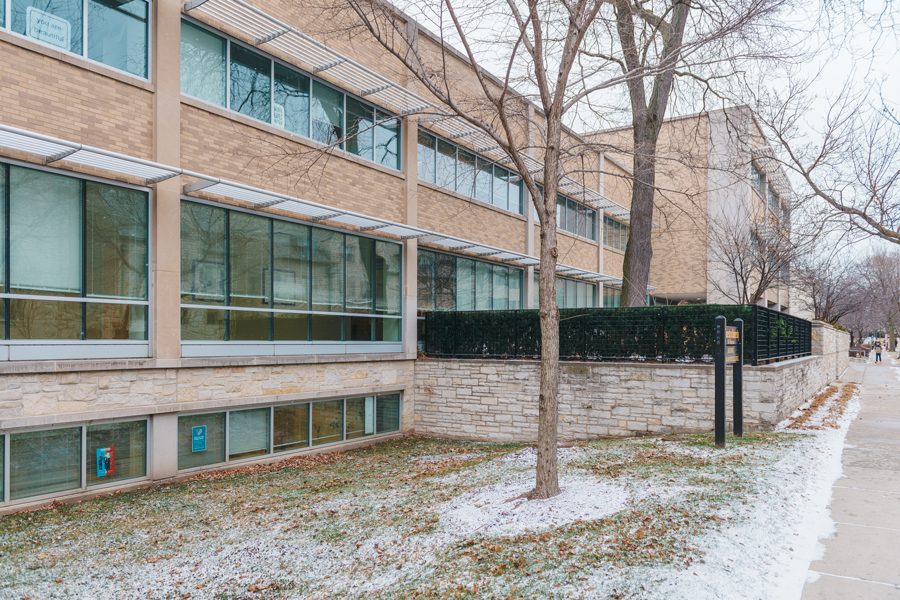At University Health Services, student medical care continues beyond COVID-19 testing
Daily file photo by Noah Frick-Alofs
Northwestern University Health Service. Health Services have continued both in-person and remotely despite the COVID-19 pandemic.
October 22, 2020
When Communication sophomore Brendan Kaplan was experiencing fever, chills and lethargy, he booked an appointment for symptomatic COVID-19 testing through Northwestern University Health Service. But two days after his visit, he tested negative.
Soon after his partner tested positive for mononucleosis, Kaplan immediately booked another appointment online and was seen at Searle for a mononucleosis blood test the same day.
“We continued to provide virtually all of our services from the very beginning of the COVID contagion,” NUHS Executive Director Dr. Robert Palinkas wrote in an email. “When many other medical practices temporarily cut off face to face care, we chose to continue that service.”
While symptomatic COVID testing continues in the tent outside, a balance of telehealth, extra staff and a distancing protocol have allowed Searle to remain close-to-normal non-COVID-19 operational standards, Palinkas said. He added that having a pandemic health plan in place even before the COVID-19 outbreak helped prevent a total shutdown.
About 30 percent of Searle visits are currently being conducted virtually, Palinkas wrote, allowing students living at home to continue getting care. It also allows some staff members to work remotely. But while telehealth visits may be sufficient for some diagnoses and treatment plans, Palinkas wrote that some tests, like x-rays, are “not suitable” for video call, and some students may just prefer being in person.
Palinkas wrote that his staff has tried to reduce crowding in waiting rooms by offering more appointments, with intentionally shorter wait times. Currently, 42 percent of students who request appointments are seen within one day. Palinkas explained that this is easier because there are fewer students in Evanston than usual. In addition, 10 new nurses and contact tracers have been hired so far to keep wait times short.
The second floor, which houses specialty services like gynecology and blood work, reopened Sept. 18. Kaplan said that during his visit, the floor was “a ghost town, which is kind of how I want it to be, especially in this COVID pandemic.”
Searle is also currently offering flu shots on the first floor, a service students like Weinberg sophomore Lillian Jirousek have already taken advantage of.
“I haven’t felt in danger when I’m there that there wasn’t proper social distancing,” Jirousek said. “I’ve gotten all the things that I need still, which is nice.”
Jirousek said when she went to get her shot, there were four other students in the waiting room, but they were called in one at a time for vaccinations. Jirousek called her experience “seamless,” but did note some staff appeared stressed.
Both Kaplan and Jirousek said they found Searle’s COVID-19 guidelines — including mandatory mask wearing and social distancing — effective. Currently, students are required to present their COVID Symptom Tracker app status at the front desk and are separated on entry if their status is red.
“We have added more cleaning service inside the building, our staff wear appropriate protection and the building has numerous hand sanitation stations, tissues and masks for use,” Palinkas wrote.
Palinkas and his staff are now working on a plan to provide health care over winter break, expecting a continued demand for telehealth especially. But so far, he said, he feels the operational changes have been successfully implemented.
“The pandemic demonstrated that our staff has the commitment and resilience to rise up when challenged,” Palinkas wrote.
Email: ilanaarougheti2023@u.northwestern.edu
Twitter: @ilanaarou
Related Stories:
— Northwestern Medicine to manage Health Service in Evanston
— Administrators talk “Wildcat Wellness,” COVID-19 testing plans in fourth discussion with NU community



